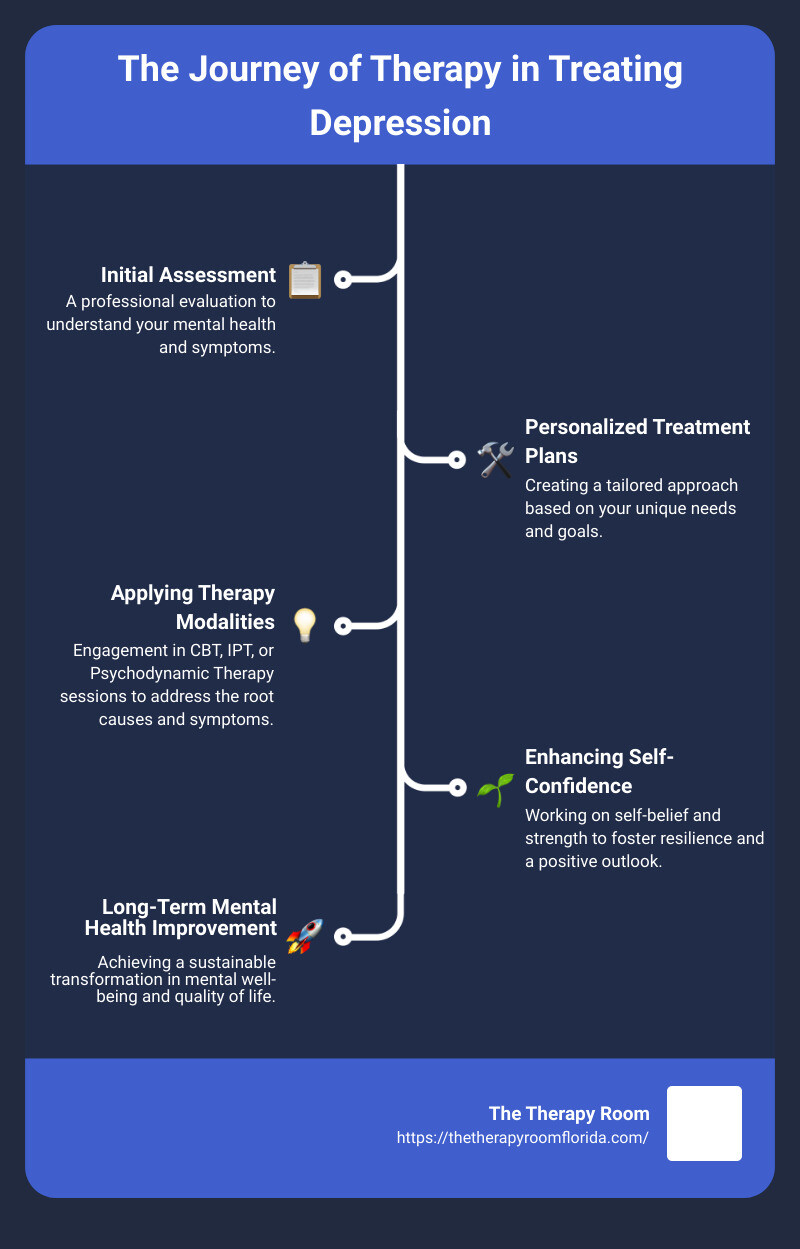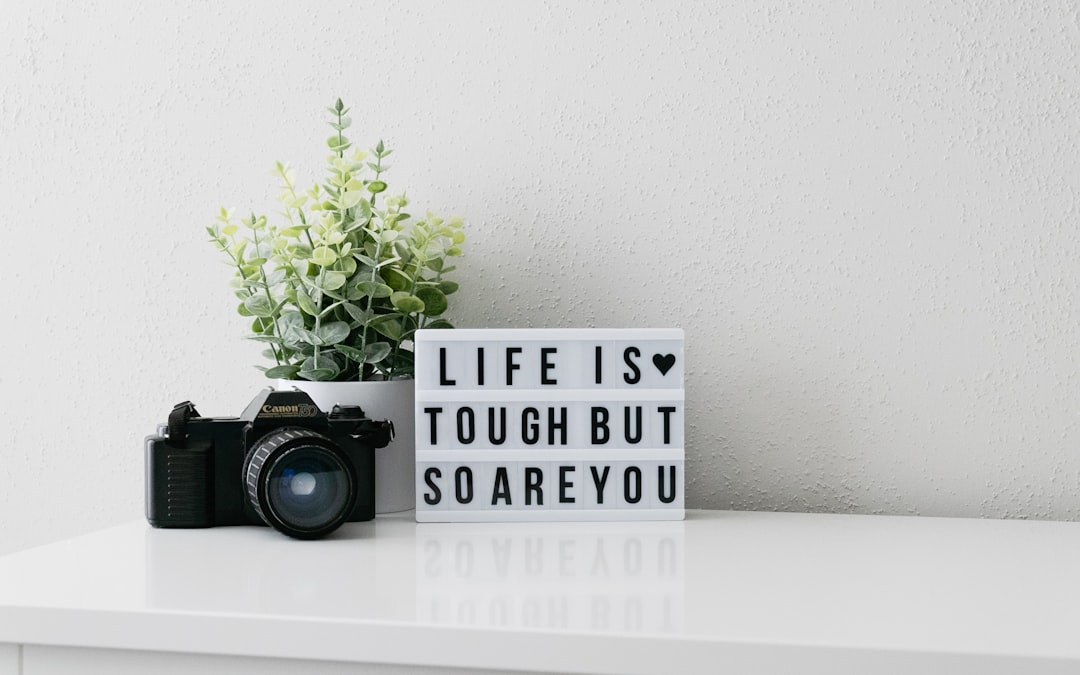Quick Guide: Therapy’s Role in Treating Depression
– Safe Space: Therapy provides a confidential environment to discuss your feelings and thoughts.
– Coping Skills: You learn strategies to manage depression and its symptoms.
– Self-Discovery: Therapy aids in understanding the root causes of your depression.
– Stress Reduction: Offers tools to reduce stress and improve decision-making.
Are you feeling overwhelmed, sad, or disconnected from the things you used to enjoy? If yes, you’re not alone. Depression affects millions worldwide, turning daily tasks into formidable challenges. The good news is, therapy can be a powerful tool in treating depression, offering a beacon of hope for those who feel lost.
At The Therapy Room, we believe in the transformative power of therapy to not only combat depression but also enhance overall mental well-being. Our experts are dedicated to providing personalized care, ensuring that you receive support tailored to your unique needs. This guide will explore how therapy helps in treating depression, underlining its importance and effectiveness. From changing negative thinking patterns to enhancing self-confidence, therapy offers a multidimensional approach to tackling the complexities of depression.
Understanding the role of therapy is crucial in taking the first step towards recovery. Whether it’s through individual or group sessions, the goal is to empower you, fostering resilience and a brighter outlook on life.

Understanding Depression
The Importance of Seeking Help
The Role of Therapy in Treating Depression
Depression is a complex mental health condition, but with the right approach, it can be effectively managed. At The Therapy Room, we’ve seen firsthand how therapy plays a crucial role in treating depression. Let’s dive into three key therapeutic approaches that have proven to be highly effective.
Cognitive Behavioral Therapy (CBT)
CBT is a widely recognized and effective treatment for depression. It focuses on identifying and changing negative thought patterns and behaviors that contribute to depressive symptoms. The core idea is simple: change your thoughts, change your mood.
How CBT Works:
– Identifying Negative Thoughts: With CBT, we help you recognize the negative thoughts contributing to your depression.
– Challenging Negative Thoughts: Together, we challenge these thoughts and replace them with more balanced and positive ones.
– Behavior Modification: We also work on changing behaviors that may worsen your depression, encouraging activities that can improve your mood and well-being.
CBT is highly structured, making it easier to track progress and see results. It’s about empowering you with the tools to manage your depression outside of therapy sessions.
Interpersonal Therapy (IPT)
IPT focuses on the interpersonal relationships of the individual and how they affect one’s mood. The underlying belief is that improving communication patterns and how one relates to others can significantly reduce the symptoms of depression.
The Goals of IPT:
– Enhance Communication: We help you develop healthier ways to express emotions and needs, improving relationships.
– Resolve Role Disputes: IPT addresses conflicts with significant others, helping to solve problems and reduce stress.
– Adjust to New Roles: We guide you through transitions and changes in life roles, reducing the depressive symptoms that can come with change.
IPT is particularly effective for individuals whose depression is closely tied to their relationships and social environment.
Psychodynamic Therapy
Psychodynamic therapy explores the deeper, often unconscious, roots of depression. It aims to uncover past experiences and unresolved conflicts that may be contributing to your current state.
Key Components of Psychodynamic Therapy:
– Self-Reflection: This therapy encourages deep self-reflection to understand the emotional patterns developed over time.
– Exploration of Past Experiences: We explore past experiences that may influence your current emotional state.
– Understanding Relationship Patterns: Understanding how past relationships shape current ones can provide insights into overcoming depression.
This approach is more exploratory and less structured than CBT or IPT, offering a deep-dive into the subconscious drivers of depression.
At The Therapy Room, we understand that each individual’s journey with depression is unique. That’s why we offer a range of therapeutic approaches, including CBT, IPT, and psychodynamic therapy, tailored to meet your individual needs and support you in overcoming depression. Our goal is to provide you with the skills and insights you need to achieve lasting emotional well-being.
How Therapy Helps in the Treatment of Depression
When you’re caught in the grips of depression, the world can feel like a shadowy place. At The Therapy Room, we understand this deeply. That’s why we’ve dedicated ourselves to illuminating the path to better mental health through therapy. Let’s explore how therapy, particularly focusing on aspects like changing negative thinking patterns, enhancing strengths, self-confidence, and self-belief, and identifying negative thoughts in relation to self and world, plays a crucial role in treating depression.
Changing Negative Thinking Patterns
One of the most transformative aspects of therapy is its ability to help you change negative thinking patterns. Depression often traps you in a cycle of pessimistic thoughts, convincing you that things will never improve. Through techniques rooted in Cognitive Behavioral Therapy (CBT), we work with you to challenge and replace these harmful thoughts with more balanced and positive ones. It’s like reprogramming a computer; we help you update the software of your mind to run more positively.
Enhancing Strengths, Self-Confidence, and Self-Belief
Often, depression can make you feel like you’ve lost all sense of power and control in your life. Therapy acts as a beacon, guiding you to rediscover and enhance your strengths, self-confidence, and self-belief. It’s about focusing on what you’re good at, and the qualities that make you unique and resilient. We believe in empowering you, enhancing your strengths to rebuild the self-esteem that depression may have eroded. This empowerment is a critical step towards not just overcoming depression, but thriving in the face of it.
Identifying Negative Thoughts in Relation to Self and World
Depression doesn’t just affect how you see yourself; it skews your view of the world around you. In therapy, we place a significant emphasis on helping you identify these negative thoughts and their origins. Understanding the “why” behind your feelings can be enlightening, offering a new perspective that challenges your current worldview. By addressing these thoughts directly, we can start to dismantle the negative beliefs that contribute to your depression, paving the way for a more positive outlook on life.
At The Therapy Room, we know the journey out of depression isn’t easy, but it’s possible with the right support and tools. Our approach to therapy is designed to address the root causes of your depression, transforming how you think and feel about yourself and the world. By changing negative thinking patterns, enhancing your innate strengths, and tackling negative perceptions, we guide you towards a more hopeful and fulfilling life.
Seeking help is a sign of strength. If you’re ready to start your journey towards healing, we’re here to support you every step of the way. Together, we can unlock the door to a brighter, healthier future.
Different Treatment Options for Depression
Depression is a multifaceted condition, and its treatment requires a personalized approach. Beyond therapy, several other methods can play a crucial role in managing and overcoming depression. Here, we explore antidepressant drugs, electroconvulsive therapy (ECT), and hypnosis as alternative or complementary options to therapy.
Antidepressant Drugs
Antidepressant medications are often prescribed to help correct chemical imbalances in the brain that contribute to depression symptoms. They work by affecting neurotransmitters related to mood regulation, such as serotonin, norepinephrine, and dopamine.
How They Help:
– Improve Mood: Antidepressants can help to elevate your overall mood, making daily tasks and activities feel less daunting.
– Reduce Symptoms: These drugs can decrease the intensity of depression symptoms, such as feelings of hopelessness, sadness, and lack of energy.
Important Considerations:
– It may take several weeks to notice improvements.
– Side effects vary by medication and individual response.
– Always consult with a healthcare provider for a personalized assessment.
Electroconvulsive Therapy (ECT)
ECT is a medical treatment most commonly reserved for severe depression, particularly when other treatments have not been effective. It involves sending small electric currents through the brain, intentionally triggering a brief seizure.
How It Helps:
– Rapid Symptom Relief: ECT can provide quick relief from severe depression symptoms, sometimes after other treatments have failed.
– Life-Saving Potential: For individuals at high risk of suicide, ECT can be a critical option for immediate symptom relief.
Important Considerations:
– ECT is performed under general anesthesia and involves a series of treatments.
– Memory loss or confusion can occur as temporary side effects.
Hypnosis
Hypnosis is a less conventional but promising option for treating depression. It involves entering a trance-like state of deep concentration and relaxation, guided by a therapist, to explore and address underlying psychological factors contributing to depression.
How It Helps:
– Mindful Awareness: Hypnosis can increase mindfulness and the ability to observe thoughts without judgment, reducing the impact of negative thinking patterns.
– Emotional Release: It can provide a safe space to explore and release emotions that may be contributing to depression.
Important Considerations:
– Effectiveness can vary widely among individuals.
– It is often used as a complementary treatment rather than a stand-alone solution.
At The Therapy Room, we understand the complexity of depression and the importance of finding the most effective treatment plan for each individual. Whether it’s through traditional therapy, medication, or alternative treatments like ECT and hypnosis, our goal is to support you in navigating through the challenges of depression towards a path of recovery and well-being.
The journey to overcoming depression begins with recognizing the need for help and exploring the options available to you. If you or someone you know is struggling with depression, we encourage you to reach out and schedule an appointment with us. Together, we can determine the most appropriate treatment approach tailored to your unique needs and circumstances.
When to Seek Treatment for Depression
Depression is more than just feeling sad or going through a rough patch; it’s a serious mental health condition that requires understanding and treatment. Knowing when to seek help can be the first step towards recovery. Let’s break down the key indicators and impacts of depression on daily life, simplifying the journey to recognizing the need for professional support.
Recognizing the Signs of Depression
Depression manifests in various ways, affecting every aspect of a person’s life. Here are some signs that it might be time to seek treatment:
- Persistent Sadness or Hopelessness: A deep, unshakable feeling of sadness or despair that doesn’t go away, often without a clear cause.
- Loss of Interest: A noticeable disinterest in activities once enjoyed, including hobbies, social activities, or sex.
- Changes in Sleep Patterns: This can include insomnia or sleeping too much, affecting daily energy levels.
- Appetite or Weight Changes: Significant weight loss or gain not attributed to dieting or changes in eating habits.
- Fatigue: Feeling tired all the time, even without physical exertion, leading to a decrease in energy levels.
- Difficulty Concentrating: Trouble focusing on tasks at work or at home, making decisions, or remembering details.
- Feelings of Worthlessness or Guilt: Harsh criticism of oneself for perceived faults and mistakes.
- Physical Symptoms: Unexplained aches or pains, headaches, cramps, or digestive problems that do not ease even with treatment.
Understanding the Impact of Depression on Daily Life
Depression can touch every part of your life, making even simple tasks feel insurmountable. It can lead to:
- Strained Relationships: Withdrawal from family and friends, leading to isolation and worsening the feelings of loneliness and sadness.
- Workplace Challenges: Decreased productivity, absenteeism, and difficulty maintaining professional relationships.
- Health Risks: Increased risk of developing other medical conditions such as heart disease, or worsening existing health issues due to neglect.
- Substance Use: Turning to alcohol or drugs as a way to self-medicate or escape from depressive feelings.
If you’re experiencing any of these symptoms or impacts, it’s important to reach out for help. Depression is not a sign of weakness or something you can just “snap out of.” It’s a medical condition that requires professional treatment.
At The Therapy Room, we understand that taking the first step towards seeking help can be daunting. We’re here to provide a supportive, understanding environment where you can openly discuss your feelings and experiences. Whether you’re dealing with mild or severe depression, our therapists are equipped with the tools and knowledge to help you navigate through this challenging time.
Seeking treatment for depression is a sign of strength, not weakness. You’re taking a critical step towards regaining control of your life and well-being. If you or someone you know is struggling, don’t hesitate to contact us. Let’s work together towards a happier, healthier you.
The Effectiveness of Therapy in Treating Depression
Depression can be a daunting adversary, but therapy has proven to be a powerful ally in the battle against it. Understanding how therapy measures up to other treatments, like antidepressant medication, as well as the long-term benefits it offers, can provide insight into why it’s such a valuable tool.
Therapy vs. Antidepressant Medication
The debate between the effectiveness of therapy versus antidepressant medication has been ongoing. However, research and clinical experience have shown that therapy, particularly cognitive-behavioral therapy (CBT), can be as effective as antidepressants for many individuals struggling with depression. Unlike medication, which primarily targets the chemical imbalances in the brain, therapy addresses the underlying thoughts, behaviors, and patterns contributing to depression.
One of the critical advantages of therapy over medication is the lack of physical side effects. Antidepressant medications can sometimes lead to unwanted side effects, which can discourage patients from continuing their treatment. Therapy, on the other hand, offers a safe space to explore and understand one’s emotions and thoughts without these physical health concerns.
Moreover, therapy equips individuals with tools and strategies to cope with depression that can last a lifetime. While medication can offer quick relief, its benefits often diminish once the treatment stops. Therapy’s impact, conversely, extends far beyond the end of the treatment period, providing lasting change. Our approach at The Therapy Room emphasizes empowering the individual by enhancing their strengths, self-confidence, and self-belief, setting a solid foundation for long-term mental health.
The Long-Term Benefits of Therapy
Therapy’s value extends well beyond the immediate alleviation of depression symptoms. It offers long-term benefits that can fundamentally alter how an individual copes with stress, adversity, and the challenges of life. These benefits include:
- Changing Negative Thinking Patterns: Therapy helps individuals identify and change the negative thinking patterns that contribute to depression, fostering a more positive outlook on life.
- Enhancing Strengths, Self-Confidence, and Self-Belief: By focusing on the individual’s strengths, therapy boosts self-confidence and self-belief, crucial elements for overcoming depression and preventing relapse.
- Identifying Negative Thoughts in Relation to Self and World: Therapy aids in recognizing the harmful thought patterns related to one’s self-perception and worldview, enabling individuals to adopt healthier perspectives.
A significant long-term benefit of therapy is its effectiveness in preventing relapse. Learning the skills to manage thoughts and emotions during therapy sessions allows individuals to apply these techniques throughout their lives, reducing the likelihood of future depressive episodes. This aspect of therapy is particularly important, as it empowers individuals to maintain their mental health proactively.
In conclusion, while antidepressant medication can be an effective treatment for depression, therapy offers a comprehensive approach that addresses the root causes of depression and provides tools for long-term management. At The Therapy Room, we are committed to supporting our clients through their journey to recovery, offering personalized care that meets their unique needs. If you’re ready to explore how therapy can help you overcome depression, we invite you to learn more about our services and take the first step towards a brighter, more fulfilling life.
Conclusion
The Power of Therapy in Overcoming Depression
In wrapping up our guide on the role of therapy in treating depression, it’s clear that therapy offers a powerful path to overcoming depression. By engaging in therapy, individuals can learn to challenge and change negative thinking patterns, enhance their strengths, self-confidence, and self-belief, and identify negative thoughts in relation to themselves and the world around them. The transformative power of therapy lies not just in addressing the symptoms of depression but in equipping individuals with the tools they need for lasting emotional resilience and well-being.
At The Therapy Room, we’ve seen firsthand the remarkable journeys of individuals who’ve found hope and healing through therapy. Our tailored approach ensures that each person’s unique needs are met with compassion and expertise, fostering a safe environment for growth and recovery.
Encouraging Others to Seek Help
If you or someone you know is struggling with depression, remember, seeking help is a sign of strength, not weakness. Encouraging others to seek help can be a pivotal step in their journey towards healing. The first step can often be the hardest, but it’s also the most crucial. By sharing the benefits of therapy and offering support to those in need, we can help break the stigma around mental health and encourage a culture of understanding and compassion.
At The Therapy Room, we’re committed to supporting anyone who walks through our doors, ready to embark on their path to recovery. If you’re considering therapy for depression, explore our services and discover how we can support you. For those looking to deepen their understanding of mental health, visit our blog for valuable insights and resources.
Healing begins with the first step. Let’s take that step together towards a happier, healthier you.





